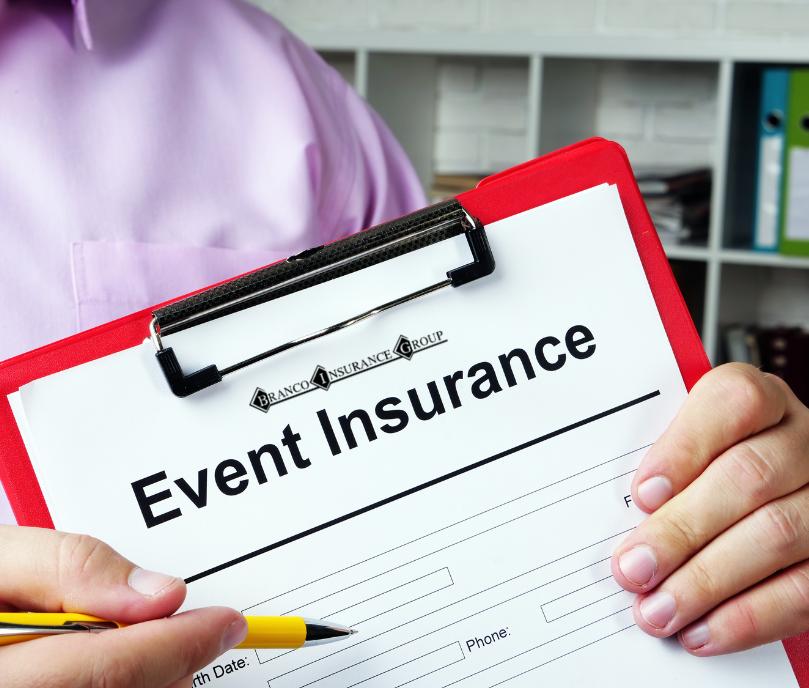
What Types of Auto Insurance Coverage Do I Need?
Understanding auto insurance is essential for both legal compliance and financial protection. Auto insurance isn’t just a requirement—it’s a safeguard against risks like accidents, theft,

You’ve spent months planning your event. You’ve sent out the invitations, booked the venue, and hired the caterer. The day is finally here, and everything is going perfectly. But then, disaster strikes. A guest slips and falls, or a piece of equipment fails and causes damage. Suddenly, your event isn’t looking so perfect anymore.
That’s where event insurance comes in. Event insurance protects you from the financial consequences of an unexpected accident or incident at your event. But with so many different policies available, how do you know which one is right for you?
If you’re planning on hosting an event, you may be wondering if you need event insurance. Event insurance is a type of insurance that protects you in the case of accidents, injuries, or property damage that may occur during the course of your event.
Event insurance can cover a variety of different things, including but not limited to the following:
Whether or not you need event insurance depends on various factors, including the size and scope of your event, the venue where your event is being held, and whether or not alcohol will be served at your event. If you’re unsure whether or not you need event insurance, it’s always best to avoid caution and purchase a policy.
Whether or not you need event insurance depends on a variety of factors. It would help if you considered things like the size and scope of your event, the location of your event, and your budget. If you’re unsure whether or not you need event insurance, it’s always best to speak with an insurance agent to get their professional opinion.
The first step in choosing the right event insurance policy is understanding the available types of coverage. Some common types of event insurance policies include:
General Liability Insurance: This type of insurance protects you from claims arising from bodily injury, property damage, personal injury, and more. It can also cover medical expenses if a guest is injured at your event.
Cancellation Insurance: This type of insurance protects you if you have to cancel or postpone your event due to an unexpected circumstance, such as bad weather or a last-minute illness. Cancellation insurance can reimburse you for non-refundable deposits and other expenses related to canceling your event.
Equipment Rental Insurance: This type of insurance protects you from damage to equipment that you rent for your event. It can cover the cost of repairs or replacement if the equipment is damaged or stolen.
Weather Insurance: This type of insurance protects you from losses incurred if bad weather causes your event to be canceled or postponed. Weather insurance can reimburse you for lost revenue and other expenses related to rescheduling your event.
There are a few factors that you should consider when trying to decide if you need event insurance or not. First, what is the size of your event? If you’re only inviting a few close friends and family, then the chances of something going wrong are pretty slim. However, if you’re planning a large-scale event with hundreds or even thousands of guests, then the chances of something going amiss go up significantly.
Second, what kind of event are you hosting? A small dinner party differs significantly from a concert or an outdoor festival. The latter two events will typically require more extensive insurance coverage due to the larger number of people in attendance and the increased risk of property damage.
Finally, what is your budget for the event? If you have a limited budget, you may want to forego purchasing insurance in favor of using that money to cover other expenses. However, if you have the financial means to do so, purchasing event insurance can give you peace of mind knowing that your event is protected against potential risks.
There is no one-size-fits-all answer when it comes to deciding if you need event insurance or not. Ultimately, it comes down to considering the size and scope of your event, what type of event it is, and your budget. If you have any concerns about whether or not your event should be insured, don’t hesitate to reach out to an experienced insurance agent for guidance.
The cost of event insurance depends on several factors, including the type of event, the location of the event, the size of the event, and more. However, as a general rule of thumb, you can expect to pay between 1% and 5% of your total budget for event insurance. So, if your event costs $10,000 to put on, you would likely pay between $100 and $500 for event insurance.
Whether or not event insurance is worth it is a decision that you’ll need to make based on your individual circumstances. However, we generally believe that event insurance is always worth it. After all, it’s better to be safe than sorry! Plus, the peace of mind that comes with knowing you’re protected in case something goes wrong is priceless.
When it comes to protecting your dream event from potential disasters, event insurance is well worth the investment. For a few hundred dollars, you can have peace of mind knowing that you’re covered in case something goes wrong. When deciding, be sure to weigh the costs and benefits to make the best decision for your particular situation.
Once you’ve decided which type of coverage you need, you’ll need to choose how much coverage to buy. The amount of coverage you need will depend on several factors, including the size and location of your event, the number of guests expected, and the activities that will take place.
To determine how much coverage you need:
The first step in choosing the right event insurance policy is understanding the available coverage types. Some common types of event insurance coverage include:
Cancellation/postponement insurance: This type of coverage protects you if you have to cancel or postpone your event due to an unforeseen circumstance, such as bad weather or a last-minute illness.
Liability insurance: This type of coverage protects you if someone is injured at your event or if property is damaged. It can also provide coverage if you are sued as a result of an accident that occurred at your event.
Property damage insurance: This type of coverage protects you if property owned by you or rented by you for the event is damaged or destroyed.
Once you understand the available types of coverage, it’s time to start thinking about how much coverage you need. The amount of coverage you need will depend on various factors, such as the size and location of your event, the number of people attending, and the type of activities that will take place.
It’s always better to err on the side of caution when it comes to choosing your coverage limits. That way, if something does happen, you’ll be covered. Speak with an experienced insurance agent to help you determine how much coverage is suitable for your needs.
It’s essential to understand the available coverage types and choose the right policy for your needs. An experienced insurance agent can help you determine the amount of coverage you need to protect yourself from potential risks.
No one wants to think about what could go wrong on their big day, but the truth is that things sometimes do go wrong. That’s why event insurance exists. If something does happen and you need to file a claim, here’s what you need to do.
1. First, try to resolve the issue with the vendor or service provider. Oftentimes, they will be willing to work with you to make things right.
2. If you cannot resolve the issue with the vendor or service provider, reach out to your insurance company as soon as possible.
3. Your insurance company will then assign an adjuster to your case. The adjuster’s job is to investigate the claim and determine whether or not it is covered under your policy.
4. Once the adjuster has decided, they will provide you with a written report outlining their findings.
5. If you agree with the adjuster’s decision, no further action must be taken. If you disagree with the decision, you have the right to appeal it.
6. Appeals are typically handled by a panel of independent experts who will review the case and make a final determination.
7. Once a decision has been made, you will be notified in writing of the outcome of your appeal.
Filing a claim can be stressful, but it’s important to remember that you have rights and options available to you. If something goes wrong, don’t hesitate to contact your insurance company for help.
You’ve been planning your big day for months, and now it’s finally here. The caterers are setting up, the flowers are being delivered, and the guests are starting to arrive. But then you realize…you forgot to get event insurance.
Don’t worry. You’re not alone. Event insurance is one of those things that’s often overlooked in the excitement of planning a big day. But it’s important to know what your event insurance policy covers—and what it doesn’t. Here’s a quick rundown of some of the most common events that are not covered by event insurance:
Paid attendance events: If you’re charging people to attend your event, chances are your event insurance policy won’t cover you. That includes things like concerts, festivals, and other paid-ticketed events.
Events with animals: Many event insurance policies will exclude coverage for events that involve animals, so if you’re planning on having ponies at your child’s birthday party or dogs at your wedding, you may want to check with your insurer first.
Sporting events: Most event insurance policies will also exclude coverage for sporting events, so if you’re planning on having a football game or a soccer match as part of your event, you’ll need to purchase a separate policy.
Bachelor/bachelorette parties: Bachelor and bachelorette parties are also typically excluded from event insurance policies. So if you’re planning on doing something wild and crazy to celebrate your last night of freedom, be sure to check with your insurer first.
Another common exclusion from event insurance policies is intentional acts. If you or someone working on behalf of your event does something on purpose that causes injury or damage, your event insurance policy will not cover it. For example, if you stage a fake fight as part of your entertainment and someone gets hurt, your insurer will not pay for their medical bills.
Finally, most event insurance policies exclude dangerous activities. If your event includes activities like bungee jumping or rock climbing, you need to make sure that you have a policy that explicitly covers those activities. Otherwise, any accidents that occur during those activities will not be covered by your event insurance.
Event insurance is essential for any big day, but knowing what your policy covers (and doesn’t) is critical. Paid attendance events, events with animals, sporting events, and bachelor/bachelorette parties are all standard exclusions from event insurance policies. So if you’re planning something outside the box, be sure to check with your insurer first to see if you’re covered.
No matter what event you’re hosting, you always want to ensure your guests are safe. Accidents and mishaps can happen anytime, so it’s essential to be prepared. Here are a few tips to help you keep your event safe and prevent any accidents or mishaps from happening:
1. Get Event Insurance: One of the best ways to protect your event is to get event insurance. This will help cover any damages that may occur during your event and any injuries your guests may sustain. Event insurance is a must-have for any type of public gathering, so ensure to get it before your event takes place.
2. Have a First Aid Kit on Hand: Another way to keep your event safe is to have a first aid kit on hand. This will come in handy if anyone gets injured during your event. Make sure to stock your first aid kit with all of the essentials, such as bandages, antiseptic cream, and pain relievers.
3. Hire Security: If you’re hosting a large event, then you should definitely hire security guards to help keep an eye on things. Security guards will be able to assist if any problems arise, and they’ll also help deter any potential troublemakers from causing any problems in the first place.
4. Follow all Local Laws and Regulations: Before you start planning your event, familiarize yourself with the local laws and regulations that apply to events in your area. This will ensure that you’re following all of the necessary rules and guidelines, which will help keep your event safe and free from any legal issues.
Following these tips can help ensure that your event is safe and free from any accidents or mishaps. Be sure to get event insurance, have a first aid kit on hand, hire security guards if necessary, and follow all local laws and regulations. By taking these precautions, you can rest assured knowing that your event will be safe and successful.
When you are planning an event, one of the most important things to consider is event insurance. But with so many policies and options available, it can be challenging to know which policy is right for your needs. Here are a few things to keep in mind when choosing event insurance:
1. The type of event you are hosting will determine the type of coverage you need. If you are hosting a large public event, you will need a different policy than if you are hosting a small private gathering.
2. The location of your event is also essential. If your event is in a public space, you will need to ensure that your policy covers damages to property.
3. The number of people attending your event will also affect the type of coverage you need. If you are expecting a large crowd, you will need a policy that covers liability in case someone is injured at your event.
4. The length of your event will also influence the type of coverage you need. If you are hosting a multi-day event, you must ensure that your policy covers all days of the event.
5. Make sure to read the fine print of any policy you are considering. Some policies have exclusions or limitations that you should be aware of before you purchase.
By keeping these things in mind, you can be sure to choose the right event insurance policy for your needs.
Event insurance protects you from financial losses if something goes wrong at your event. Many different event insurance policies are available, so choosing the right one for your needs is essential. To do this, start by estimating the total cost of your event and the maximum amount that would have to be paid out in damages if someone was injured at your event. Then, get quotes from several different insurers to compare rates and coverage options side-by-side. By taking these steps, you can find an affordable policy that will give you peace of mind on event day, knowing that you’re protected in case of an accident or incident. If you have any other questions about event insurance or what types of event insurance you should get for your special day, contact our event insurance experts at Branco Insurance Group.
Branco Insurance Group can help you find the right event insurance policy for your needs. We offer a variety of policies to suit any type of event, and our team of experts can help you find the perfect coverage for your needs. Contact us today to get started.

Understanding auto insurance is essential for both legal compliance and financial protection. Auto insurance isn’t just a requirement—it’s a safeguard against risks like accidents, theft,

Many small businesses conduct themselves directly online. Having employees who are not properly trained in cybersecurity can increase the risk of a cyberattacks. Adequate cybersecurity
